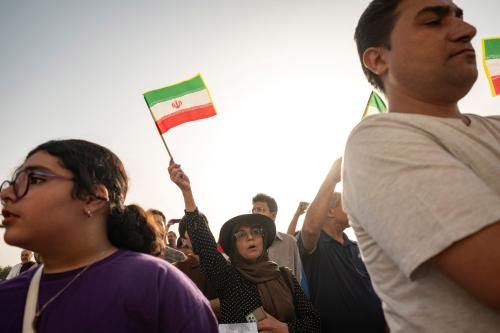

Bruce Blair, a Senior Fellow in Foreign Policy Studies at the Brookings Institution, and an expert on issues involving command and control for nuclear weapons in the post-Cold War era, has been awarded a $350,000 MacArthur Fellowship, the John D. and Catherine T. MacArthur Foundation announced today.
Blair, a former Air Force missile launch officer, was one of 32 winners of MacArthur Fellowships, which provide cash stipends ranging from $250,000 to $375,000, spread over five years, for the recipients to spend any way they please.
“We look everywhere for the most exciting among us and give them a chance to follow their best instincts over an extended period of time,” explained Daniel J. Socolow, director of the MacArthur Fellows Program.
In its description of Blair’s work on nuclear weapons control, the MacArthur Foundation said, “He has developed compelling alternative proposals for ‘de-alerting’ nuclear weaponry that would substantially diminish the possibility of inadvertent nuclear strikes.”
Brookings President Michael H. Armacost praised Blair in these words: “Bruce Blair has been at the cutting edge of research on the issues that define nuclear stability in the post-cold war era. The MacArthur Fellowship is a fitting tribute to the quality and significance of his work.”
Richard N. Haass, Brookings vice president and director of Foreign Policy Studies, the program to which Blair is attached, commented, “Bruce Blair’s research on nuclear stability meets two important standards: it is rigorous and it matters. Indeed, his work has gone a long way toward defining a critical dimension of a post-Cold War agenda for the United States, Russia and others.”
Bruce Blair has worked with the Brookings Institution since 1987. While at Brookings he taught defense analysis as a visiting professor at Yale and Princeton Universities. Prior to coming to Brookings, Blair was a Project Director at the Office of Technology Assessment, United States Congress. He received his Bachelor of Science Degree in Communications from the University of Illinois in 1970 and then served in the Air Force Strategic Reconnaissance Wing of Offut Air Base, Nebraska from 1971-72 and as a launch officer for Minuteman missiles in Montana from 1972-74. He earned a Master’s Degree in Management Sciences at Yale University in 1977, and was awarded a Ph.D. in Operations Research by Yale in 1984. He was awarded a Russian Language Institute Fellowship at Yale.
He is the author of numerous books and articles on defense issues. His current project is a book titled, De-Alerting Strategic Forces (Brookings, forthcoming). Among his best known works are Global Zero Alert for Nuclear Forces (Brookings, 1995), The Logic of Accidental Nuclear War (Brookings 1993), Crisis Stability and Nuclear War (Oxford University Press, 1988, co-editor with Kurt Gottfried), and Strategic Command and Control (Brookings, 1985), winner of the Edgar S. Furniss Award.

Joshua Rovner
July 2, 2025

Pavel K. Baev, Robert Einhorn, Sharan Grewal, Samantha Gross, Ryan Hass, Patricia M. Kim, Elizabeth N. Saunders, Yun Sun, Caitlin Talmadge, Shibley Telhami, Andrew Yeo
July 1, 2025

Suzanne Maloney
June 28, 2025